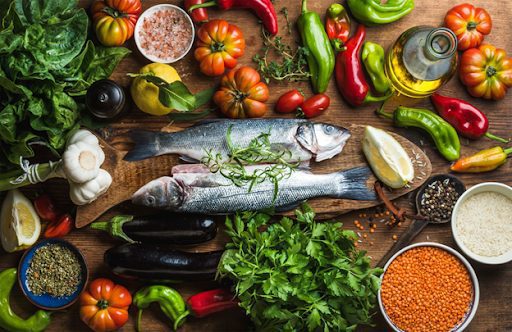The nutrition we receive from our food plays a pivotal, and multi-layered role in the way we develop. Our diet provides us with the necessary building blocks for our health and survival, not just physically, but emotionally and cognitively as well. Read on to understand more about the relationship between nutrition and mental health.

The food and drinks we consume make up our diet, and provide us with the proteins, fats, carbohydrates, vitamins, and minerals we need to survive. Our energy is derived from our diet, with nutrients such as vitamin C acting to protect us from harmful elements in our bodies and environments, such as free radicals.
The nutrition in our food also affects our mental health. Together with sleep, genetic predispositions, and the existence of stressors, what we eat can influence our emotional stability, level of patience, ability to concentrate and more.
Specifically, multiple empirical testing has found clear mental health benefits to certain diets: specifically, a Mediterranean diet consisting of regular and high intakes whole grains, fruit, vegetables, fish, olive oil, low fat dairy products, and antioxidants, was found to be associated to a reduced chance of developing depression, with some studies finding a 32% reduced risk for the mental health condition.
Similarly, a study attempting to alleviate symptoms of depression found that participants who consumed many food groups central to the Mediterranean diet, such as vegetables, fruits, whole grains, oily fish, raw nuts, extra virgin olive oil, legumes, fruit and vegetables, presented significant levels of depression symptom alleviation.
Diets high in antioxidants and anti-inflammatory foods have also been linked to reduced levels of depression. One possible explanation for this is that these compounds contribute to gut health, with an established link between proper gut and brain functions.
On the other hand, adhering to a Western diet, composed of a high intake of processed and red meat, refined grains, candy, high-fat dairy products, and potatoes, has been linked to an increased chance of developing depression. Higher percentages of saturated fats and sugars—considered Western diet staples—were found to be associated with a higher risk of developing anxiety.
Research has found a link between low levels of important nutrients and the existence of mental health conditions. A depletion of vitamins B6, B12, and D, as well as folate acid, zinc, and iron have been found to be associated with increased levels of depression, anxiety, and moodiness.
That said, while insufficient amounts of such nutrients have been shown to be related to mental health issues, consuming extra amounts of these nutrients, when one already has enough in their daily intake, has not been shown to alleviate adverse mental health disorders. It is only those who suffer from low levels of the necessary nutrients who have been shown to benefit from adding supplements to their diets.
Additionally, while dietary supplements have been shown to offer some mental health benefits, such as in the above-mentioned cases of deficiency, experts nevertheless recommend receiving one’s nutrients from their diet whenever possible. The main reason for this is because much about dietary supplements remains unknown. As our bodies are meant to extract the necessary nutrients from our food, it is therefore recommended to primarily rely on what we eat and drink from our overall nourishment.

Water is an essential part of any healthy diet. Among its many benefits, it contributes to good circulation, gut health and digestion, weight loss, joint movement, and nutrient absorption. Its effects on our physical health cannot be overstated, but recent studies have also highlighted some of its mental health benefits, with special attention given to the role a lack of water, or dehydration, plays with anxiety.
Though dehydration is believed to contribute to the development of symptoms of both depressive and anxiety, its link to anxiety has been found to be significant, with repeated studies finding it to increase the risk of this disorder. Though not a clinical disorder, moodiness has also been shown to increase with dehydration, as have confusion and fatigue. Improved mood has been linked to an increase in one’s water intake.
On the other hand, those who regularly drink more water have a lower risk of developing either anxiety or depression. This compared to individuals who drink less than the recommended amount.
Generally speaking, it is suggested that men drink 13 cups of water a day. Women are recommended to drink nine glasses a day, and pregnant and breastfeeding women are recommended to drink 12 cups a day.
Signs that you might be not be drinking enough water include:
Proteins are made of amino acids, with our body producing up to 12 of the essential amino we need, with the remaining eight supplied to us through our food. As many of the brain’s neurotransmitters are also composed of amino acids, a diet that does not provide the necessary amount could interfere with the brain’s proper functioning. The neurotransmitters serotonin and dopamine are made of amino acids (tyrosine and tryptophan, respectively). Since both of these neurotransmitters have been found to be involved with emotion or mood regulation, as lack of either amino acid could cause a detrimental effect on one’s emotional well-being, resulting in a low mood or aggression.
High-protein foods such as meat, dairy products, and eggs can provide us with these amino acids. Vegetarian and vegan options also exist, though high-protein plant products such as beans, peas, and grains may be missing one or two of the essential amino acids, making supplements an important alternative to those with meat-restrictive diets.
The context in which we consume our food has also been shown to contribute to our mental health. Sharing our meals in particular has been associated with creating a feeling of structure to our day, as well as building a sense of community with those around us. Interacting during mealtime helps learn more about each other’s lives, ward off feelings of loneliness or isolation, and contribute to a more comfortable environment. All this, just by splitting your lunch with a coworker.